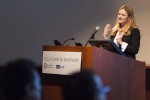A panel of experts calmed fears of an Ebola virus outbreak in Los Angeles at an informational forum Tuesday night.
The event, put on by the UCLA Center for World Health in association with the L.A. World Affairs Council, was arranged to educate the public about symptoms and treatment of the virus, as well as preparation efforts in L.A. County.
“We wanted to provide a forum, because there’s been so much spinning around of Ebola,” said Dr. Thomas Coates, the event moderator and director of the UCLA Center for World Health.
Most of the people at the event said they went to learn more about the virus and how county health officials are preparing.
“I wanted to know how (the Ebola virus) came to be and learn more about the response,” said Yao Chang Tan , a first-year undeclared life sciences student.
Speakers from UCLA School of Public Health, Ronald Reagan Medical Center, the L.A. County Department of Public Health and the International Medical Corps delivered short speeches about the current situation. Then, more medical experts and doctors joined the speakers in a question-and-answer panel.
Dr. Anne Rimoin, associate professor of the School of Public Health, talked about the history, symptoms and transmission of the virus by describing past outbreaks and the 21-day incubation period before patients are infectious. Dr. Zachary Rubin, assistant professor of medicine, listed ways that UCLA has prepared to deal with Ebola patients, which included preparation, protection suits and proper training. He noted the drill held last week as an example.
Dr. Laurene Mascola from the L.A. County Department of Public Health noted the diversity of the L.A. population, the wealth gap and population’s mobility as factors that could hinder a response to a case of Ebola. However, she stressed the quality of healthcare and the cooperation of multiple agencies as a reason not to panic.
Nancy Aossey, the CEO of International Medical Corps, talked about her experiences in West Africa and asked for additional volunteers and financial aid. She also said she thinks tackling the problem in Africa is the only way to seriously manage the epidemic.
Compiled by Ryan Leou, Bruin contributor.

The event was co-hosted between UCLA Center for World Health, Burkle Center, and LA World Affairs Council.